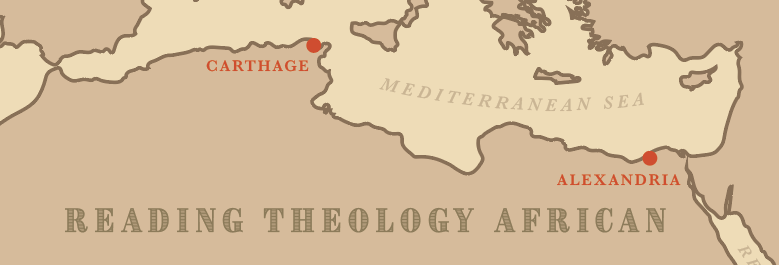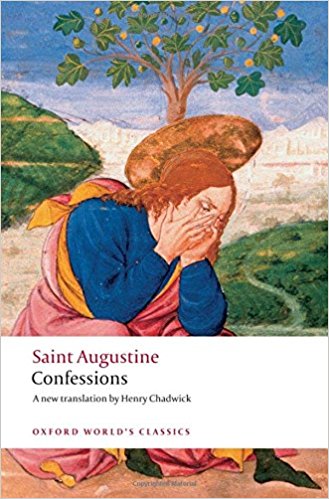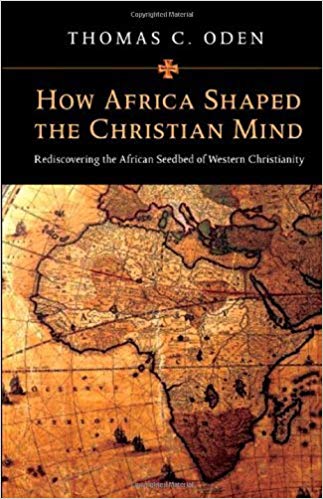
If you read a lot of early Christian theology, you’re probably reading a lot of texts from Africa. But chances are that you’re reading them without registering anything African about them.
Think of patristic texts by authors of African provenance: Tertullian, Cyprian, Clement of Alexandria, Origen, Athanasius, Didymus the Blind, Augustine, Cyril, and so on.
 The curricula of the Torrey Honors Institute and the new M.A. Classical Theology in particular dictate that students and faculty are regularly immersed in primary texts like this. But like everybody else, we are in the habit of reading them without awareness that they are African. To our students, Augustine seems Roman/Italian and Athanasius seems Greek/Byzantine (perhaps because our paperbacks are from Catholic and Orthodox editorial projects).
The curricula of the Torrey Honors Institute and the new M.A. Classical Theology in particular dictate that students and faculty are regularly immersed in primary texts like this. But like everybody else, we are in the habit of reading them without awareness that they are African. To our students, Augustine seems Roman/Italian and Athanasius seems Greek/Byzantine (perhaps because our paperbacks are from Catholic and Orthodox editorial projects).  Even in older scholarly literature, North Africa is sometimes treated as so romanized, and Alexandria so hellenized, that neither count as African. In their own ways, students reading these primary texts in English translation often register these authors as entirely un-ethnic, or perhaps vaguely European, or even, as they might say, “white.”
Even in older scholarly literature, North Africa is sometimes treated as so romanized, and Alexandria so hellenized, that neither count as African. In their own ways, students reading these primary texts in English translation often register these authors as entirely un-ethnic, or perhaps vaguely European, or even, as they might say, “white.”
We are already reading African theology, in other words, but we aren’t reading it African (or reading it as African, or reading it Africanly). We don’t know how to, either as teachers or as students. Nor are we alone in this: lots of programs read and teach theology from Africa without having the tools to register the significance of its provenance.
 For the next few years, Torrey Honors Institute and the MA Classical Theology intend to host a series of lectures and workshops with the goal of learning how to read African patristics in a way that does not efface their origin, but instead is mindful of their African origin. We would like to draw on the excellent scholarly work that has been done in the past twenty years or so in the fields of patristics and ancient history, and especially on the more popular and accessible work associated with Thomas Oden (whose 2007 book How Africa Shaped the Christian Mind marks a symbolic point at which evangelicals began to notice the discussion) and the Center for Early African Christianity.
For the next few years, Torrey Honors Institute and the MA Classical Theology intend to host a series of lectures and workshops with the goal of learning how to read African patristics in a way that does not efface their origin, but instead is mindful of their African origin. We would like to draw on the excellent scholarly work that has been done in the past twenty years or so in the fields of patristics and ancient history, and especially on the more popular and accessible work associated with Thomas Oden (whose 2007 book How Africa Shaped the Christian Mind marks a symbolic point at which evangelicals began to notice the discussion) and the Center for Early African Christianity.
But Torrey and MACT’s Reading Theology African initiative has a different focus from previous work in this field. We know our business: the main thing we do is read old books together. So we are undertaking to learn how to read, in English translation, great texts of early African Christian theology in such a way that teachers and students alike are aware that they are crossing cultures and receiving from ancient African teachers.
The outcomes of the project will not be scholarly publications, but a set of pedagogical resources of various kinds. We may find that we need to adjust our text selections: Athanasius’ Contra Gentes, with its critique of animal idolatry, may locate this church father more readily in Egypt than its second half, De Incarnatione, read in isolation. Augustine’s writings aimed more specifically at a Carthaginian audience, such as De Catechizandis Rudibus, doesn’t have the scope of On Christian Teaching, but it might illuminate his context better. Tertullian’s Apology may be an intentional display of Romanitas where his To the Nations fronts his Africanitas. So we may be able to make more effective reading assignments as the project develops.
We may find that lectures or handouts on key bits of historical-cultural background could be strategically deployed. In Torrey Honors, at the undergraduate level, we are very careful not to let historical background over-determine the reading of the primary text. But by trial and error we can hope to learn how much context is too much, and how much is just right.
But the main payoff of Reading Theology African should be tactics for leading Socratic discussions: orienting concerns, evocative questions, observations about the imagery and argument of specific great texts, lines of investigation, and angles of insight into these texts. We are trying to find out how our particular pedagogical commitments (classic primary texts in English translation, limited background information so that external history does not over-determine the textual voice, confidence in the voice of great authors to reach current students, and a commitment to active learning in small groups guided by a Socratic tutor) can further the task of connecting contemporary evangelicals to early African Christian influence.
We expect that a lot of our outcomes will be transferable to other educational contexts, and to churches. We may be able to launch church-based discussion circles on this model, especially in churches where there is some contemporary urgency about connecting with Christianity’s ancient African heritage.
All we really know how to do in Torrey is sit in circles and talk about classic texts; but we know how to do this extremely well, especially at the undergrad level. So we are not trying to overreach or overpromise, but we want to do all we can with these tools at hand.
Our first public event will be in early December 2018, as Dr. David Wilhite, author of Ancient African Christianity: An Introduction to a Unique Context and Tradition (Routledge: 2017), gives an orienting lecture and leads some discussion of primary texts from Tertullian the African. If you’re near Biola on Tues Dec 4, keep an eye out for publicity about Dr. Wilhite’s public lecture. And watch this space for further progress from the Reading Theology African initiative.